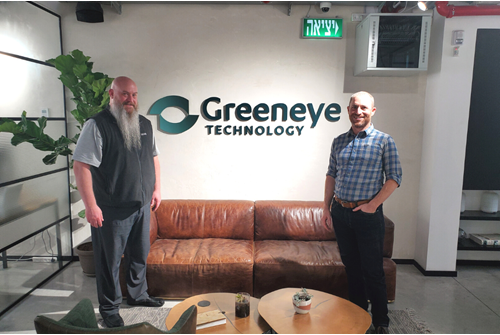
Advancing opportunities for Israeli agricultural
technology companies to conduct research and development on large row crop and
livestock production systems in Nebraska
that are unavailable in the Middle East is one goal of a recent visit to Israel
by Ryan Anderson, Director of Industry Relations for the University of Nebraska-Lincoln, and Industry Liaison Officer for the NU Connections program.
“Israel is flush with entrepreneurial scientists and engineers who are building startup companies and bringing their deep expertise to bear on precision agriculture,” says Anderson, who made the trip to Israel in November. “Their ag tech ecosystem is inherently innovative because they had to literally green a desert for national food production.”
While the United States is an attractive market for Israel’s Ag experts, “a lot of their technology has not been tested or deployed in large row crop systems or large animal systems like we have in Nebraska,” he says. “I was able to showcase NU resources and people and how we can work remotely with them on actual deployment and testing, while they in turn receive objective scientific evaluation from NU’s faculty, technical staff and students, and in some cases our farmers, ranchers and ag professionals.”
Anderson’s trip included attending large agriculture events, as well as visiting several cities to promote existing and prospective university and Nebraska partnerships in agriculture technology, research and development, and business expansion. He attended Israel’s FoodTechIL events in Tel Aviv, and the AgriVest Conference, with its full-day pitch competitions and expo space to engage directly with dozens of Israel-based startups.
Outside the conferences, he traveled to meetings in several cities including Haifa, Binyamina-Giv'at Ada, Majdal Shams near the Golan Heights, and Nazareth.
This trip, and Anderson’s earlier visit in 2019 as a member of a Nebraska coalition of the Lincoln Partnership for Economic Development, Greater Omaha Chamber of Commerce, Department of Economic Development and UNeMED, is producing positive results for Nebraska and Israel.
“We have several companies that have become research partners with UNL on active projects,” he says. “We have also recruited an Israeli company’s COO to relocate to Lincoln to establish U.S. operations through The Combine initiative.” The Combine incubator hosts food and agriculture technology companies at its headquarters at Nebraska Innovation Campus and leads them through its statewide commercialization program.
“We have also helped secure the hiring of a Nebraskan to act as a representative for an Israeli company, and we have ongoing discussions with other Israeli startups to either set up shop here, or hire Nebraska representatives,” Anderson says.
Andersons’ visit is one example of the efforts of the University of Nebraska and NU Connections to promote Nebraska business both within and outside the state. The NU Connections program unites the University of Nebraska campuses to promote university programs, services and resources that businesses locally or globally can utilize.
Administered by the Nebraska Business Development Center (NBDC) at UNO, NU Connections provides access to startup assistance, laboratory and facility use, research and technology development, market research and other services. NU Connections is a U.S. Economic Development Administration (EDA) University Center program.
“Ryan Anderson has built a career helping businesses connect to the resources available through the University of Nebraska system,” says Catherine Lang, NBDC Executive Director. “Through the collaborations sparked by NU Connections, we are learning from other countries and bringing back that knowledge and experience to expand opportunities for our state.”
Anderson says Nebraska offers the world “tremendous resources” in markets, established operations and intellectual talent.
“This trip to Israel and others like it work to promote the state and the UNL Innovation Campus as a preferred destination partner,” he says. “Being there in person really helps to build these relationships and trust. Making the effort to travel halfway around the world to get to know people shows Nebraska is in it for the long term.”

